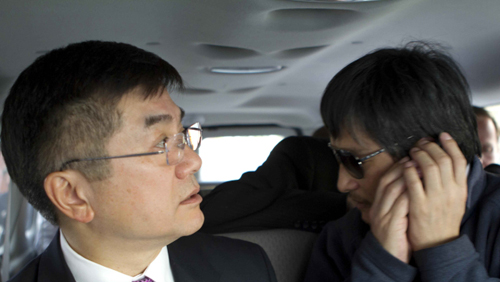By Charles Hutzler
The Associated Press

U.S. Ambassador to China Gary Locke (left) escorts blind activist Chen Guangchen from the U.S. Embassy in Beijing to a hospital (Courtesy of U.S. Embassy of Beijing)
BEIJING (AP) — The blind activist at the center of a diplomatic tussle between the United States and China did not set out to be a dissident. Chen Guangcheng taught himself law to defend the constitutional rights he saw trampled so often.
“After Chen’s surprising escape from his well-guarded rural home on April 22 and into the protection of U.S. diplomats in Beijing, his fate is now being discussed in high-level negotiations. Both governments are trying to keep the case from overshadowing Secretary of State Hillary Clinton’s arrival for annual talks on global hotspots and economic imbalances.
Chen’s predicament — his improbable flight to hoped-for freedom — has thrilled the many Chinese who are savvy enough to get around Internet censorship to learn about it. And it has reaffirmed for his supporters the qualities they have long admired. Chen displays a determination for upholding the law, while exuding a charisma that reassures those around him.
“He’s just the most extraordinary person,” said activist blogger He Peirong on Friday, four days after she picked up a bloodied Chen outside his village and sped toward Beijing and shortly before she was detained by police for helping him.
“He never gives up. He’s very spirited, willful, and optimistic,” she said.
His principled steeliness was on display in a video statement recorded, while he was in hiding last week. In it, he calmly catalogs the mistreatment of him, his wife, his 6-year-old daughter, and his mother, while under house arrest. He names the officials who took part in the abuse and then demands an investigation and the protection of his family members, whose whereabouts are not known.
“I also ask that the Chinese government safeguard the dignity of law and the interests of the people, as well as guarantee the safety of my family members,” Chen said.
Left blind by a fever as an infant, Chen eventually left his boyhood in Dongshigu village, amid the corn and peanut fields of Shandong province, to attend a school for the blind. Later, while studying acupuncture and massage — traditional trades for the blind in China — at Nanjing University of Chinese Medicine, he taught himself law.
Even before graduating, he began championing the rights of the disabled and farmers in Dongshigu and surrounding areas. He petitioned officials to eliminate taxes on disabled farmers and collected signatures from farmers to shut down a polluting paper factory. His reputation soared after he successfully sued Beijing’s subway operator to allow the blind to ride for free. Profiles and reports in the national media followed.
In 2005, Chen and his wife Yuan Weijing documented complaints about forced abortions and sterilization used to enforce a family planning campaign run by Linyi, the city that oversees Dongshigu. Among the cases were several women who said they were forced to have abortions within days of their due dates.
Officials often resort to such illegal measures to enforce policies that limit families to one or two children, fearing they will otherwise fail to meet national population targets and derail their chances for promotion. An investigation by the national family planning commission later validated Chen’s claims, and said that some local officials had been punished for their wrongdoing.
The affair set local leaders against Chen.
He and his family were confined to their home and repeatedly beaten by people he and his wife have said were hired by the local government. When activist lawyers from Beijing tried to see them, they too were beaten and chased away.
In 2006, he was put on trial and sentenced to four years in prison for “damaging property and organizing a mob to disturb traffic,” charges that apparently stemmed from the confrontation between supporters and those enforcing his house arrest.
After his release, he still wasn’t free. His house arrest continued, enforced by surveillance cameras and teams of hired locals who guarded his house and the streets into the village. Activists, diplomats, foreign media, and Hollywood actor Christian Bale all tried to break the security cordon only to be chased away.
Chen’s video last week listed some of the indignities his family suffered. His daughter Kesi is followed to school, her bag ransacked to make sure she’s not carrying anything. The precaution seemed a response to Chen’s daring. In February 2011, he surreptitiously recorded a video detailing his house arrest. “I have come out of a small jail and walked into a bigger jail,” Chen said in the video.
His perseverance and mistreatment, however, spread Chen’s reputation further. “America will continue to speak out and to press China when it censors bloggers and imprisons activists,” Secretary of State Clinton said in a speech last year, “and when some, like Chen Guangcheng, are persecuted even after they are released.”
Now in U.S. protection, Chen faces a dilemma. His supporters say he wants to stay in China and live with his family in safety, rather than go abroad. Yet it’s far from certain that Beijing is able or willing to guarantee their safety, unless they take U.S. sanctuary.
Chen also struck a measured note of defiance in last week’s video message while asking Premier Wen Jiabao to investigate his family’s treatment. “If anything more happens to my family, I will continue to pursue justice.” (end)

